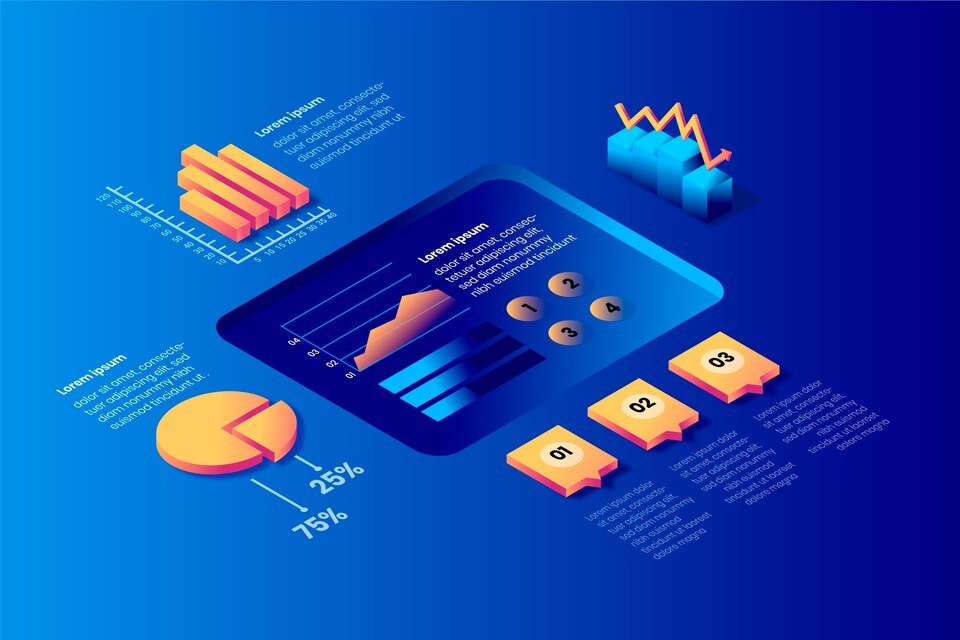In today’s data-driven business environment, having a robust data analytics platform is crucial for unlocking the full potential of your data. Making informed business decisions requires powerful data analysis tools and business intelligence software that can streamline a range of processes. This article is designed to help you select the ideal data analytics platform to suit your business’s evolving needs by carefully evaluating factors such as data management, data analysis tools, and advanced analytics capabilities.
Table of Contents
Understanding Data Analytics Platforms
Before you select a data analytics platform, it’s important to understand what it is and how it can help your business. Simply put, a data analytics platform encompasses a range of tools and technologies that allow businesses to process and analyze large volumes of data efficiently.
One of the key functionalities of a data analytics platform is data visualization. With a good data visualization platform, you can create compelling graphs, charts, and dashboards to quickly and easily communicate trends and insights hidden in your data.
Another important feature of data analytics platforms is their ability to use machine learning algorithms and predictive analytics, empowering organizations to make informed decisions backed by reliable data. These platforms allow you to uncover patterns and trends, predict future outcomes, and identify potential risks or opportunities.
Overall, data analytics platforms enable businesses to turn raw data into actionable insights, driving growth and competitive advantage. As you evaluate different data analytics tools, be sure to consider the functionalities that matter most for your organization’s needs.
Key Considerations for Choosing a Data Analytics Platform

Choosing the right data analytics platform for your business requires careful consideration of various factors. One of the most important considerations is a robust data management solution, which should offer seamless data integration capabilities. Remember that your platform should be scalable and capable of handling big data analytics to support a data-driven culture.
You should also consider data governance and data security when selecting a data analytics platform. Data governance is an essential component of data management that ensures your data is trustworthy, accurate, and readily available. Adequate data security measures must be put in place to protect sensitive information from unauthorized access.
To ensure that your business is well-equipped to handle the challenges of big data analytics, invest in a data analytics platform that supports your organization’s requirements and paves the way for data-driven decision-making processes.
Evaluating Data Analysis Tools
Choosing the right data analysis tools is imperative to make the most of your data analytics platform. These tools should enable you to explore, manipulate, and visualize data in a user-friendly manner. Look for platforms that offer advanced analytics capabilities to derive actionable insights.
Drag-and-drop functionality and customizable dashboards are key to streamlining your data analysis processes. The advanced analytics platform should offer intuitive features and allow you to build complex models without significant coding abilities.
Business Intelligence Software
Business Intelligence Software is an essential tool for any analytics platform. It involves the use of techniques and technologies to extract insights from business data and present it in a format that’s easy to understand. It can handle large volumes of data and create interactive dashboards, graphics, and reports in real-time.
Choose business intelligence software that meets your specific organizational needs. Look for BI tools that support your chosen data analysis tools and can integrate with your existing data management solution.
Advanced Analytics Platform
Advanced Analytics Platforms are crucial for organizations that require complex data models to power advanced analysis, forecasting, and decision-making. An ideal advanced analytics platform will provide a wide range of analytics features and a user-friendly interface to make navigating through enormous volumes of data effortless.
Look for platforms that offer machine learning algorithms, natural language processing, and text analytics to unlock significant insights from your data. The platform you choose should be adaptable and customizable, allowing you to tailor it to your organizational needs and scale it quickly.
Choosing the Right Data Visualization Platform

Data visualization is critical to extracting meaningful insights from your data. A robust data analytics platform should offer a variety of visualization tools, allowing you to create compelling charts, graphs, and interactive dashboards that impress your audience. When selecting a data visualization platform, look for features such as:
- Interactive filters that allow for quick drilling down into particular datasets and visualizations
- Drill-down capabilities that allow users to dig deeper into the details of the data in a more interactive and engaging way
- Real-time updates that ensure that your data is always up-to-date and relevant
These features will enable you to make the most of your data visualization platform and gain deeper insights into your data.
Harnessing the Power of Machine Learning Algorithms
Machine learning algorithms offer a powerful way to take your data analysis to the next level, allowing you to automate predictions and forecast outcomes. When selecting a data analytics platform, it’s crucial to choose one that offers integration with machine learning libraries and tools.
By building and deploying predictive models, you can enhance your decision-making processes and optimize your business strategies.
Benefits of Machine Learning in Data Analytics
Integrating machine learning algorithms into your data analytics platform offers several key advantages:
- Automated predictions: Machine learning algorithms can analyze large datasets and recognize patterns much faster than humans, allowing you to make quick and accurate predictions.
- Better insights: By analyzing your data comprehensively, machine learning algorithms provide deeper insights and uncover valuable patterns that may have gone unnoticed otherwise.
- Improved decision-making: By offering reliable predictions, machine learning algorithms can help you make more informed and data-driven decisions, enhancing your overall business strategy.
Examples of Predictive Analytics in Business
There are various ways that machine learning algorithms and predictive analytics can be applied in different industries:
| Industry | Application |
|---|---|
| E-commerce | Utilizing predictive analytics to recommend products to customers based on their past purchase behavior or browsing history |
| Healthcare | Using predictive analytics to diagnose medical conditions or forecast readmission rates for patients |
| Finance | Employing predictive analytics to assess credit risk or detect fraudulent transactions |
Incorporating machine learning algorithms and predictive analytics into your data analytics platform can provide you with a significant edge over your competitors. By enabling automated predictions, deeper insights, and more informed decision-making, you can stay ahead of the competition and drive growth for your business.
Importance of Data Management Solutions

Having a reliable data management solution is crucial for any data analytics platform to be effective. Such a solution should provide robust data integration, accurate data quality, and data governance functionalities. Accurate data management ensures that your data is trustworthy, clean, and accessible. This is vital to support your decisions with reliable data.
With a comprehensive data management solution, you can access better data, such as cost data to determine programmatic success or perform real-time data analytics that allow you to identify revenue drivers and plan more effectively. Accurate data management also allows for greater data sharing, providing better game performance metrics and greater accuracy throughout your organization.
To give an example, having a data management solution that allows field service reps to access the same customer data as customer service can allow for fewer dispatches and decrease your response time while increasing your rate of first-time fixes.
| Advantages of a Comprehensive Data Management Solution | Benefits |
|---|---|
| Robust data integration | Connect all data sources with accuracy |
| Data quality | Trustworthy data to support decisions |
| Data governance functionalities | Ensures data protection, accessibility, and compliance with regulations |
Investing in a robust data management solution is an investment in your organization’s success. It ensures you have access to accurate data, which enables informed decision-making and business growth. With the increasing importance of big data analytics, investing in a data management solution is an indispensable decision that provides a competitive advantage.
Leveraging Big Data Analytics
In today’s era of big data, businesses need to process and analyze large volumes of data efficiently. Therefore, having a data analytics platform that supports big data analytics technologies such as Hadoop or Spark is critical. With these tools, you can extract valuable insights from massive datasets.
Advanced analytics capabilities such as text analytics or sentiment analysis can enhance your data exploration further. Choosing an advanced analytics platform that offers these capabilities can help you gain a competitive advantage by enabling data-driven decision-making.
Data-Driven Decision-Making
With a data analytics platform, you can make informed decisions based on reliable insights. Predictive analytics capabilities and advanced statistical models allow you to forecast future trends, identify potential risks, and optimize your business processes to give you a competitive edge in today’s fast-paced business environment.
By utilizing powerful data analysis tools and predictive analytics, you can stay ahead of the curve in the constantly evolving digital landscape. For example, you can use predictive analytics to forecast consumer behavior and tailor your marketing strategies accordingly.
Embracing data-driven decision-making leads to more accurate and efficient decision-making processes. Using the insights provided by your data analytics platform, you can make informed decisions that drive business growth and enable you to reach your goals faster.
Making the Right Choice: Selecting an Advanced Analytics Platform
With the rapidly evolving technology landscape, businesses must keep up with the latest advancements in data analytics. Advanced analytics platforms combine the power of data analytics, artificial intelligence, and machine learning to provide deep insights and automate decision-making processes.
When selecting an advanced analytics platform, consider factors such as:
- Scalability: Choose a platform that can grow with your business and handle large quantities of data.
- Integration Capabilities: Ensure the platform can integrate easily with your existing technology stack.
- Pre-built Analytics Modules: Look for platforms that provide pre-built analytics modules to accelerate time-to-value and enable fast deployment of advanced analytics.
By selecting the right advanced analytics platform, your organization can gain insights that enable you to make informed decisions and improve business outcomes. When evaluating potential platforms, focus on your unique needs and match them with the platform that most effectively meets them.
Best Practices for Implementing a Data Analytics Platform
Implementing a data analytics platform can be a game-changer for your organization, but it’s important to do it right. Here are some best practices to follow:
1. Start with a pilot project
Before deploying the data analytics platform across your entire organization, start with a small pilot project to validate its capabilities and ensure that it meets your specific needs. This approach allows you to fine-tune the platform according to your unique requirements and identify potential roadblocks at an early stage.
2. Provide proper training and support
Investment in proper training and support is critical for the successful implementation of a data analytics platform. Ensure that your team members receive sufficient training and guidance to maximize the platform’s effectiveness. Consider appointing a dedicated data analytics expert or team to lead the implementation and provide ongoing support.
3. Regularly monitor and evaluate performance
Continuous monitoring and evaluation are essential to ensure that the data analytics platform is delivering the expected results. Keep track of key performance indicators such as data accuracy, user adoption, and cost-effectiveness. Regularly evaluate the platform’s performance and identify opportunities to optimize data analysis and decision-making processes.
4. Align with your organization’s goals
When implementing a data analytics platform, it’s crucial to align it with your organization’s goals and objectives. Decide what you want to achieve through data analysis and choose tools and software that fulfill those needs. Ensure that your platform is scalable and can evolve alongside your organization’s changing needs.
Conclusion
Choosing the right data analytics platform is crucial for businesses to gain valuable insights and stay ahead of the competition. By considering factors such as data management, data analysis tools, and advanced analytics capabilities, you can find the ideal platform that aligns with your organization’s goals and drives business growth.
Investing in a robust data analytics platform can unlock the full potential of your data, enabling you to make informed decisions and drive business success. With comprehensive business intelligence software, you can harness the power of data-driven decision-making and optimize your business processes.
Implementing a data analytics platform requires careful planning and execution. Consider starting with a pilot project to validate the platform’s capabilities before scaling it across your organization. Ensure proper training and support for your team members to maximize the platform’s effectiveness. Regularly monitor and evaluate the platform’s performance to continuously improve data analysis and decision-making.
Don’t delay your organization’s data-driven transformation any longer. Invest in a powerful data analytics platform today and stay competitive in the digital age.





Permalink